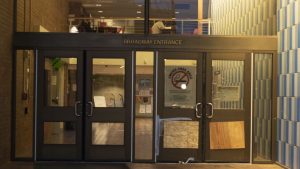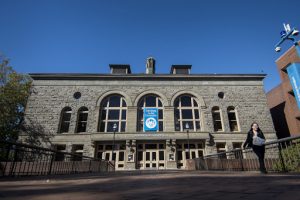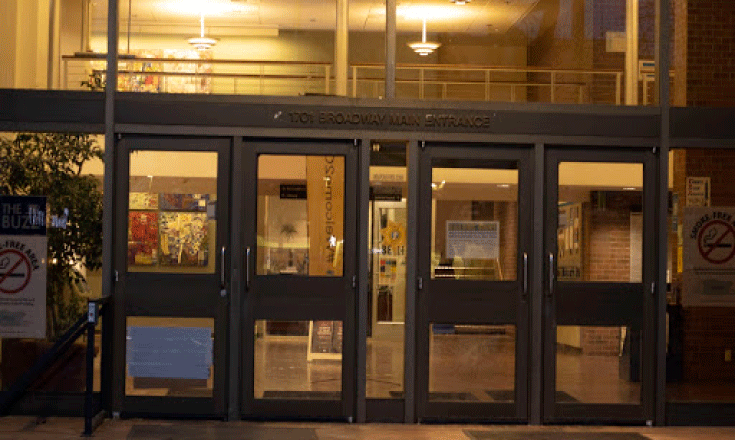If you plan on taking any classes at Seattle Central College in Fall 2019 or beyond, prepare yourself for some major changes — the school is locking down.
Approximately a year ago, Central’s administration decided to change the door policy for all Central-affiliated campuses. Instead of all doors staying unlocked until 7:00 pm, as has been the practice, side doors will be locked and will require a keycard for access. Keycards/chips will be part of student IDs, so all students should have access, but for non-students one main entrance will stay unlocked for everyone; at the Broadway Edison campus, for example, the main doors opening onto the Buzz cafe and the security office will be unlocked and everything else will be secured.
The use of the doors in front of the security office is very intentional; Bruce Riveland, Central’s Vice President of Administrative Services and head of the administrative committee working on the implementation of the locks and keycards, explains that “when President [Sheila] Edwards-Lang arrived,” he explains, “she talked to different groups across campus, and she got repeated expressions of concern about safety from students and faculty.”
These security concerns generally were on the subject of “running into ‘unwelcome guests’ — what we assume are homeless people taking sponge baths in the bathroom, people with mental health problems talking to the air or using loud voices… and in some cases, people being aware of drug use or knowing that there’s somebody passed out in the corner.” Keeping only the main doors unlocked means security has an easier time “keep[ing] the unwelcome guests from drifting in any of these side doors and going up and hanging out.”
Campus Security Officer Tracy Yorker and Lyall Rudenskjold, assistant director of the Office of Multicultural Services, can cite one infamous example of an “unwelcome guest” causing issues for students and staff. “Several years ago,” Yorker says, “a gentleman having a paranoid psychotic break ran into Central to escape from the police, who were trying to check if he was okay.” According to the two, this man ran into the women’s 3rd floor bathroom and climbed into the ceiling to flee security and police, only to later fall through the ceiling of a different women’s bathroom, ultimately leading to police taking him away.
As Riveland says, “The background leading up to [the decision to lock the doors] is the desire to up the internal security of the building. … Employees and students should both be able to move through their day without being made uncomfortable by people who really don’t belong here.”

There is a question, though, of how much key cards will improve campus security. As many students have now seen, during the break the Broadway entrance doors to the BE building were vandalized; in the hours leading up to Christmas, a man smashed through the glass at the bottom of the then-locked doors. He entered the building, throwing some objects around before leaving. The doors are currently blocked up with plywood until the glass can be replaced. Locking the doors couldn’t have prevented this, but this is also not the most common issue at Central.
President Edwards Lange and several other faculty members have had experience with similar practices to the proposed key cards at other institutions — the University of Washington, for example, issues every student a “husky card” that’s a keycard, meal pass, and orca card all in one. According to Riveland, other options weren’t really considered since “lots of people gave testimony to the fact that this works.”

The total cost is tentatively estimated at between $92,000 and $117,000. This includes the student ID/key cards themselves, the printer/camera setups needed for the cards, the licensing fee for the software, and a server to run the database of students, faculty, and other staff, and the addition of card readers where needed. Most doors on the Broadway Edison and SAM buildings already have readers, but places like the Broadway Performance Hall require contractors to drill into the stone of the exterior walls and install them.
The current plan is to start testing cards with small branch campuses early to mid-2019 since fewer people will be impacted if something goes wrong. This will begin at the Seattle Maritime Academy before moving over to the Wood Technology Center, then the Vocational Institute, and finally Seattle Central’s main Broadway campus.
“The bigger picture is to modernize [the campus] and make it more comfortable for students by improving the technology… and by modernizing the infrastructure” concludes Riveland.
Be sure to keep checking The Seattle Collegian for more updates as implementation of the door policy continues.







[…] previously discussed in our article, https://www.beta.seattlecollegian.com/what-is-the-price-of-safety/, campus security has been a topic of conversation among students and staff for the last few years. […]